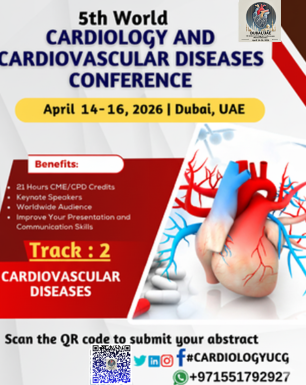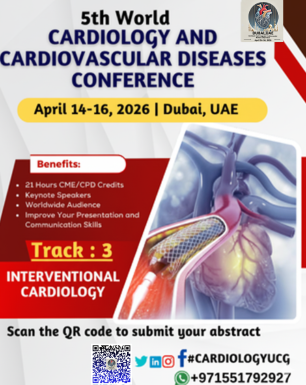Sub Topics: Coronary Artery
Disease, Heart Failure, Arrhythmias, Valvular Heart
Disease, Hypertension, Congenital Heart Disease
What is Cardiology
Cardiology is the branch of medicine that
focuses on the study, diagnosis, treatment, and prevention of diseases and
conditions related to the heart and blood vessels (the cardiovascular system).
It is a specialized area of medicine that involves the care of patients with a
wide variety of heart-related problems, from common conditions like high blood
pressure (hypertension) to more complex issues such as heart failure,
arrhythmias, coronary artery disease, and congenital heart defects.
Why Is Attendance at Conferences Important
for Cardiology?
Attendance at conferences is critically important for
cardiologists and healthcare professionals involved in cardiovascular medicine
for several reasons. Conferences offer a unique opportunity for continuous
learning, networking, and staying up-to-date with the latest developments in
the field. Here are the key reasons why attending conferences is essential in
cardiology:
1. Access to the Latest Research and
Advancements
- Cutting-edge
Science and Technology: Cardiology is a rapidly evolving field
with continuous advancements in diagnosis, treatment, and technology.
Conferences present the latest research findings, clinical trials, and
innovations in cardiac care.
- Emerging
Therapies and Techniques: New drug treatments, interventional
techniques, minimally invasive surgeries, and cutting-edge technologies
(e.g., AI in imaging, robotic-assisted surgery) are often first presented
at conferences. Attendees can learn about the latest therapies before they
become widely available.
- Access
to Clinical Guidelines: Leading cardiology societies often
present updated clinical practice guidelines and recommendations, ensuring
that practitioners are aware of the best standards of care.
2. Networking and Collaboration
- Building
Professional Relationships: Conferences provide a platform for
cardiologists, researchers, medical device companies, and other healthcare
professionals to connect. Networking with experts and colleagues can lead
to collaborations on research projects, clinical studies, and clinical
practice improvements.
- Learning
from Peers: Interacting
with peers from different specialties and geographic locations provides
insights into diverse approaches to treating cardiovascular diseases. It
can broaden one’s perspective and introduce new strategies for patient
care.
- Mentorship
Opportunities: Younger
or early-career cardiologists can benefit from the mentorship
opportunities offered at conferences. They can meet leading experts in the
field and gain career advice, as well as opportunities for training or
research collaboration.
3. Professional Development and Education
- Continuing
Medical Education (CME): Many cardiology conferences are
accredited for CME credits, allowing participants to meet licensing and
certification requirements while expanding their knowledge. CME is
essential for maintaining board certifications and staying compliant with
professional standards.
- Workshops
and Hands-on Training: Conferences often offer workshops,
hands-on training, or live demonstrations of new technologies, allowing
attendees to gain practical skills. These sessions are particularly
important in interventional cardiology, where new devices and techniques
are regularly introduced.
- Learning
from Experts: Conferences
provide access to thought leaders, renowned cardiologists, and pioneers in
the field. Their presentations and discussions allow attendees to learn
from the best in the field.
4. Staying Current with Cardiovascular
Disease Trends
- Identifying
Emerging Trends and Threats: Cardiology conferences often highlight
current trends in cardiovascular diseases, including novel risk factors,
new insights into diseases like heart failure, arrhythmias, or coronary
artery disease, and how they impact patient populations globally.
- Global
Health Perspectives: Attending international conferences
gives cardiologists a broader view of global trends in cardiovascular
health, including the latest statistics, health disparities, and
strategies for addressing heart disease worldwide.
5. Influencing Clinical Practice
- Improving
Patient Care: By
learning about the latest evidence-based practices, cardiologists can
incorporate new approaches into their clinical practice, leading to
improved patient outcomes. For example, new findings on the treatment of
heart failure or innovations in stent technology can directly influence how
cardiologists approach patient care.
- Debates
and Discussions: Many
conferences feature debates and discussions about controversial or
evolving topics in cardiology. These sessions encourage critical thinking,
providing the opportunity for healthcare professionals to question
established practices and discuss emerging ideas.
6. Exposure to New Technologies and Devices
- Medical
Devices and Software: Conferences often have exhibit halls
where companies showcase new medical devices, diagnostic tools, and software
solutions designed to improve cardiovascular care. This exposure helps
cardiologists understand how these innovations could benefit their
practice.
- Innovative
Monitoring Tools: Advances in wearable devices, remote
monitoring, and digital health technologies are often introduced at
cardiology conferences. These tools can help improve patient management,
particularly for chronic conditions like hypertension and heart failure.
7. Contributing to the Field
- Presenting
Research: For
researchers, attending conferences is an opportunity to present their own
findings to a large and engaged audience. This helps build a reputation in
the field, gain feedback on research, and expand one’s professional
network.
- Engagement
with the Community: Conferences provide opportunities for
cardiologists to contribute to the ongoing dialogue within the field,
whether through speaking, presenting posters, or participating in
discussions on the future of cardiovascular care.
8. Exposure to Global Best Practices
- International
Perspectives: Cardiologists
attending international conferences gain insight into how different
countries and regions approach cardiovascular care. This can be
particularly valuable in understanding how cultural, economic, and healthcare
system differences influence treatment practices and outcomes.
- Global
Collaboration on Research: International conferences offer an
opportunity to join or initiate global research projects or clinical
trials, leading to the development of global standards and innovations in
cardiology.
9. Inspiration and Motivation
- Renewed
Passion for the Field: Conferences are often motivational, with
passionate discussions about improving patient outcomes and advancing the
field of cardiology. Such events can rekindle a cardiologist's enthusiasm
for their work, fostering a sense of purpose and commitment to patient
care.
- Career
Development: Attending
prestigious conferences may open doors for career advancement, whether
through networking opportunities, job offers, or invitations to
collaborate on major research projects.
10. Stay Ahead in a Competitive Field
- Competitiveness
in Practice: As
cardiology is a competitive and highly specialized field, staying informed
about the latest techniques, research, and treatment options helps
cardiologists maintain a competitive edge in their practice.
- Adapting
to Rapid Changes: Given the speed at which medical
knowledge and technology evolve, attending conferences ensures that
cardiologists are not left behind, enabling them to adapt to changes and
continue providing the best possible care to their patients.





